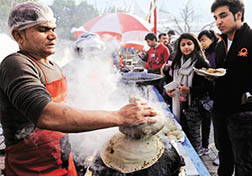
NEW DELHI - The Food Safety and Standards Authority of India (FSSAI) and Coca-Cola joined hands on Monday to train over 50,000 small-time street food vendors in hygiene and health-related aspects of food selling, starting from April. The Coca-Cola India (CCI) and the FSSAI will, under the latter's "Safe and Nutritious Food - A Shared Responsibility" theme, will provide training to the street food vendors, starting with Ludhiana in Punjab...

before moving on to other states. The move was also touted as a step in the direction of the central government's flagship Skill India programme.
Speaking on the occasion, Venkatesh Kini, President, Coca-Cola India and South West Asia, said: "Coca-Cola India is enthusiastic about partnering with FSSAI to make a significant contribution to improving the lives of the vendors and also enhancing the eating out experience for consumers. Coca-Cola India has already taken several steps towards skill enhancement, both in social as well as sporting arenas under Skill India."
This is not the first time that the American soft drink-maker would be launching such a training drive. "Parivartan", its flagship initiative, is in its 10th year and was launched well before the company came up with any Corporate Social Responsibility (CSR) scheme. "Coca-Cola India has been training 'kirana' (provisions) retailers for the past ten years under their flagship retailer training initiative - Parivartan. This collaboration with FSSAI provides an opportunity and broadens the horizons of Coca-Cola's Parivartan initiative," Kini said. The training would be completely bona fide and there would be no compulsion to stock or sell their products, he added. The FSSAI, which has also been training street vendors for years, has run such initiatives in Delhi and other states with help of the National Association of Street Vendors of India. During its previous campaigns, it was able to train 20,000 such vendors. "The idea this time is to touch the lives of every Indian, wherever he may be living, and help him get the cleanest possible food," FSSAI CEO Pawan Aggarwal said at the event.The training will include screening of audio-visual material and acquainting vendors on managing inventory, stock, and how to keep the water from getting contaminated further, keeping in view the role of infected water as the cause of most diseases.
Speaking on the occasion, Venkatesh Kini, President, Coca-Cola India and South West Asia, said: "Coca-Cola India is enthusiastic about partnering with FSSAI to make a significant contribution to improving the lives of the vendors and also enhancing the eating out experience for consumers. Coca-Cola India has already taken several steps towards skill enhancement, both in social as well as sporting arenas under Skill India."
This is not the first time that the American soft drink-maker would be launching such a training drive. "Parivartan", its flagship initiative, is in its 10th year and was launched well before the company came up with any Corporate Social Responsibility (CSR) scheme. "Coca-Cola India has been training 'kirana' (provisions) retailers for the past ten years under their flagship retailer training initiative - Parivartan. This collaboration with FSSAI provides an opportunity and broadens the horizons of Coca-Cola's Parivartan initiative," Kini said. The training would be completely bona fide and there would be no compulsion to stock or sell their products, he added. The FSSAI, which has also been training street vendors for years, has run such initiatives in Delhi and other states with help of the National Association of Street Vendors of India. During its previous campaigns, it was able to train 20,000 such vendors. "The idea this time is to touch the lives of every Indian, wherever he may be living, and help him get the cleanest possible food," FSSAI CEO Pawan Aggarwal said at the event.The training will include screening of audio-visual material and acquainting vendors on managing inventory, stock, and how to keep the water from getting contaminated further, keeping in view the role of infected water as the cause of most diseases.

 RSS Feed
RSS Feed
